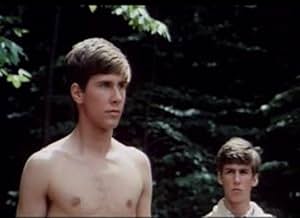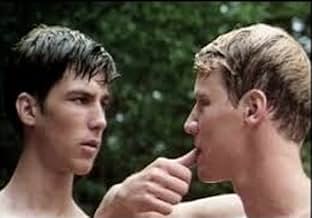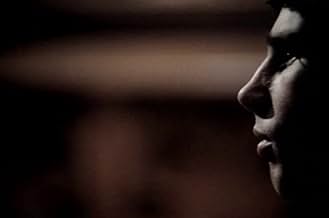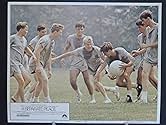CALIFICACIÓN DE IMDb
5.5/10
533
TU CALIFICACIÓN
Dos compañeras de cuarto en un colegio de Nueva Inglaterra durante la Segunda Guerra Mundial se enfrentan a la guerra, los celos y la traición. Basada en una novela de John Knowles.Dos compañeras de cuarto en un colegio de Nueva Inglaterra durante la Segunda Guerra Mundial se enfrentan a la guerra, los celos y la traición. Basada en una novela de John Knowles.Dos compañeras de cuarto en un colegio de Nueva Inglaterra durante la Segunda Guerra Mundial se enfrentan a la guerra, los celos y la traición. Basada en una novela de John Knowles.
Falko Schilling
- Student
- (sin créditos)
Steve Walker
- Student
- (sin créditos)
- Dirección
- Guionistas
- Todo el elenco y el equipo
- Producción, taquilla y más en IMDbPro
Opiniones destacadas
Many years after graduating college in New Hampshire in 1942, a nostalgic man revisits the campus of his alma mater in the off-season and reminisces about his roommate, a gregarious and reckless lad who goaded his friends into living for the day, breaking the rules and--most especially--jumping out of a tall tree into the lake below. Overlooked film version of John Knowles' semi-autobiographical novel (which, in turn, was expanded from his short story "Phineas") has a deeply personal feel even on the screen. While Knowles denied any homoerotic undercurrents in the text, those who do sense an attraction between the roommates, played here by John Heyl and Parker Stevenson, are bound to be the film's biggest admirers (when the novel is discussed in schools, it is said that homosexuality is never brought up in class, yet that hasn't stopped some schools from banning the book). There's a lovely simplicity--and, conversely, an unspoken complexity--in the friendship between the young men, which screenwriter Fred Segal cautiously, carefully tiptoes through (which is better than being tiptoed around). Director Larry Peerce works well with his actors, most of them non-professionals, and shows a keen, stylish eye for the period (surprising, since Peerce at this point had not shown much sensitivity). Not a hit with audiences, the picture grossed just under $1M at the US box office and was promptly forgotten, but it has a special sort of gleam. **1/2 from ****
I had to read this book for English and it was one of the few books I actually liked. Then we watched the movie and it was horrible. I have never seen a movie degrade a book as much as this did. The characters hardly said anything and it left out too many parts. When Leper was supposed to be skiing, when Gene was on the way to help clear the railroads, he was drawing. The acting was awful and there was no character development. They need to remake this film with characters who could act it out a little better. And then someone needs to make it so it actually follows the book.
The many negative comments on this elegant tale of the rites of adolescent angst insisted I watch again to see what they are talking about. These are teenagers so their actions aren't obliged to make sense. The pregnant pauses and alleged poor acting is awkward emotional teenage behavior mildly obscured because they're bright, articulate kids with lots of rivalries - but there is more going on here.
No one has even mentioned the emotional range of the very powerful snow-shoveling scene euphoria to unutterable sadness, screaming to silence: terrified kids. While the war is symbolic for the emotional swings of the children throughout the film it is very much less important as an influence.
Thematically what no reviewer seems to see here is the love story which foments the jealous, insecure, blind, ignorant savage underneath', illogical urge to strike out. When you don't know what else to do somebody's going to get hurt: these are scared, hormonal, vulnerable, lonely, forty's boys and coming out just isn't done.
Worse still - it may be unrequited love - even though it's just you and me buddy', and I'm good for you' and the beach is where you don't just come with anybody' and Finny's got himself and Gene undressed down to their underwear every chance he gets. Confusion reigns supreme afterward in the dorm when Gene - hasn't been the same since the beach' - and he's worried about something' unrevealed. And again later when he's wearing Finny's clothes and then again when he's stuttering on the phone.
Consider the reaction devastation when Finny thinks Gene might enlist and the ode to friendship that is the Winter Carnival where Gene wins all the gold - after training for the Olympics'. These boys are experiencing feelings which are strong and bubbling over all the time and they have no experience to cope with them.
The confession deals marvelously with the ethical problem of the selfish, sociopathic moment the stupid impulse the temporary insanity, when everything was changed forever, but in tears stops just short of Gene telling Finny he loves him. Then again in the hospital - a confession and forgiveness, but no relief from what the lad cannot express: there is no unraveling, no spilling his guts and no moment of truth.
Years later, all the fear and anger returned' - there is no peace, ever.
No one has even mentioned the emotional range of the very powerful snow-shoveling scene euphoria to unutterable sadness, screaming to silence: terrified kids. While the war is symbolic for the emotional swings of the children throughout the film it is very much less important as an influence.
Thematically what no reviewer seems to see here is the love story which foments the jealous, insecure, blind, ignorant savage underneath', illogical urge to strike out. When you don't know what else to do somebody's going to get hurt: these are scared, hormonal, vulnerable, lonely, forty's boys and coming out just isn't done.
Worse still - it may be unrequited love - even though it's just you and me buddy', and I'm good for you' and the beach is where you don't just come with anybody' and Finny's got himself and Gene undressed down to their underwear every chance he gets. Confusion reigns supreme afterward in the dorm when Gene - hasn't been the same since the beach' - and he's worried about something' unrevealed. And again later when he's wearing Finny's clothes and then again when he's stuttering on the phone.
Consider the reaction devastation when Finny thinks Gene might enlist and the ode to friendship that is the Winter Carnival where Gene wins all the gold - after training for the Olympics'. These boys are experiencing feelings which are strong and bubbling over all the time and they have no experience to cope with them.
The confession deals marvelously with the ethical problem of the selfish, sociopathic moment the stupid impulse the temporary insanity, when everything was changed forever, but in tears stops just short of Gene telling Finny he loves him. Then again in the hospital - a confession and forgiveness, but no relief from what the lad cannot express: there is no unraveling, no spilling his guts and no moment of truth.
Years later, all the fear and anger returned' - there is no peace, ever.
I went to a boarding school and this was the greatest book I ever read about boarding schools. However this movie is very weak version of the book. I wish they would make it again with a better cast. It just doesn't capture the magic of Knowles' writing.
Ok, I read the book too, but that was in - oh say- 1964 and I forgot it all. But the movie worked for me on its own merits. First of all, how many movies today are all about groups of 17 year old guys. Gone are the all-male schools and seminaries of the past. So it's a nice window onto a vanished (mostly, I think) subculture. Naturally someone in our own decade is going to read "homosexuality" into the relationships, but there was, in fact, a time when Finney could say to Gene "in this teenage period of your life, the best person to come to the beach with is your best pal, and we believed him. The cinematography was beautiful, even lyrical. I think the character of Finney was very well portrayed by John Heyl and wonder what ever happened to him. We know what happened to Parker Stevenson (he married Kirstie Alley). All in all, a succesful evocation of a time and place, whether or not it measured up to the themes and meanings of the book (which I note Leonard Matlin called "overrated" anyway.
¿Sabías que…?
- TriviaThe scene where the boys all suddenly start singing "Hitler has only got one ball" was unscripted. Director Larry Peerce continued filming to see how it played out, with the scene ending up in the final cut.
Selecciones populares
Inicia sesión para calificar y agrega a la lista de videos para obtener recomendaciones personalizadas
- How long is A Separate Peace?Con tecnología de Alexa
Detalles
- Fecha de lanzamiento
- País de origen
- Idioma
- También se conoce como
- A Separate Peace
- Locaciones de filmación
- Productora
- Ver más créditos de la compañía en IMDbPro
Taquilla
- Total en EE. UU. y Canadá
- USD 921,268
- Tiempo de ejecución1 hora 44 minutos
- Mezcla de sonido
Contribuir a esta página
Sugiere una edición o agrega el contenido que falta

Principales brechas de datos
By what name was Paz separada (1972) officially released in India in English?
Responda





















